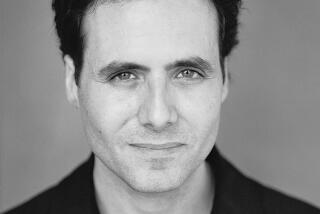Past Imperfect
It is not as if Howard Zinn set out to become the sage of the American left, not as if this 76-year-old historian in the rumpled khaki pants intended to gather groupies from his grandchildren’s generation or to become the political muse of actor Matt Damon or Eddie Vedder, lead vocalist of Pearl Jam.
When Zinn’s best-known book was published in 1980 with an initial printing of 5,000 copies, the onetime shipyard worker could never have foreseen that “A People’s History of the United States” would become a cult classic, selling more than half a million copies. Back when Zinn was routinely being thrown in jail for his political activities, he could not have dreamed that one day in late 1998, Rupert Murdoch’s Fox Television--of all places--would fly him out to Hollywood to talk about transforming “People’s History” into a 10-part miniseries.
Fox sent Zinn a first-class ticket.
“I always travel first class,” he assured the woman who arranged the trip. “But usually it’s on Greyhound.”
Waiting recently to board a plane--coach, this time, since he was paying--Zinn described a bustling speaking schedule. From Wheat Ridge, Colo., to Terre Haute, Ind., the tall, silver-haired historian was bearing the banner of progressive idealism. There was a demonstration against capital punishment in Philadelphia, a conference on economic justice on Cape Cod, a labor assembly in Lawrence, Mass.
Zinn may not be widely known outside these audiences, and the American left--what’s left of it--may appear tired and out-of-date when compared with the attention-grabbing conservative right. But to the thousands of radicals and populists who believe this country’s political system beats down on ordinary folks while benefiting a narrow elite, Howard Zinn is a guru.
Teaching in Atlanta at the dawn of the civil rights movement, his students included NAACP Board Chairman Julian Bond, Children’s Defense Fund President Marian Wright Edelman and novelist Alice Walker. He traveled to Vietnam with Father Daniel Berrigan and protested that war with Jane Fonda. California state Sen. Tom Hayden, who also went to Vietnam with Zinn, lauds Zinn for “getting the story of our country straight.”
“A People’s History” was, after all, the first major work to brand Christopher Columbus a warmongering white guy, making Zinn politically correct years before the term was invented. His dozen or more books have influenced a whole generation of dissidents, who are passing his view of the world onto children and students of their own. But even as this grandfather of the American left teams up with Fox-TV and co-executive producer Damon, others view Zinn as the godfather of the worst sort of shoddy, ideologically distorted history.
At Emory University in Atlanta, history professor emeritus Eugene Genovese said Zinn’s ideology slants the facts.
“I think it basically transforms history into a good guys-bad guys view of the world,” said Genovese, once a leading Marxist scholar but now more conservative in his views.
Yet in the thick of a conservative era, Zinn is in greater demand than ever and clearly relishes the intellectual combat. Crisscrossing the country, the former Army bombardier happily promulgates the philosophy he adopted as a young man in Brooklyn. Class-based society, he contends, is the root of almost all evil.
“The Constitution was not created by ‘we the people.’ It was created by 55 quite rich white men,” he told one audience in Denver. “The Bill of Rights doesn’t mean a lot when you don’t have the wealth and power to put those rights into action.”
Zinn admitted it was borderline blasphemy in 1980 to portray Theodore Roosevelt as a racist expansionist, or to picture Woodrow Wilson as a puppet of financier J.P. Morgan. Native Americans claim an important part of the fluid, unfootnoted narrative in “People’s History,” as do women, minorities and heroes of the labor movement. The book has been translated into half a dozen languages and twice updated.
“Howard was way ahead of the curve, in a way nobody could predict. And now, the curve in a way has caught up with Howard,” said Hugh van Deusen, Zinn’s editor at HarperCollins.
Even Zinn’s detractors portray him as gentle, relentlessly funny and, by nature, a shameless optimist. His preface to “People’s History” states that “to think that history writing must aim simply to recapitulate the failures that dominate the past is to make historians collaborators in an endless cycle of defeat.” He acknowledges that while “the cry of the poor” is not always just, “if you don’t listen to it, you will never know what justice is.”
Some of those young people who first read “People’s History” in 1980 are teachers now themselves, Nash pointed out, and the book is often part of their curriculum. Others gravitate to Zinn’s history to inform their own activism.
“Every young activist I know, including my son, they all know about Howard Zinn,” Hayden said. “They all feel they were brought up dumb to history and that Howard Zinn tells it like it is. It’s quite an amazing phenomenon.”
*
Zinn grew up in Brooklyn, one of four sons of a sometime waiter, window cleaner and pushcart peddler. Eddie Zinn’s formal education ended in fourth grade. His wife, Jenny, “who worked and worked without getting paid at all,” her son recalled, went as far as seventh grade. When Howard was 10, his parents used discount coupons to buy the complete works of Charles Dickens at a cost of pennies per week.
The English novelist “aroused in me tumultuous emotions,” Zinn writes in his 1994 memoir, “You Can’t Be Neutral on a Moving Train.” “First, an anger at arbitrary power puffed up with wealth and kept in place by law. But most of all, a profound compassion for the poor.”
In high school, Zinn was fascinated by George Seldes’ “Sawdust Caesar,” about Mussolini’s seizure of power in Italy. One day, some guys from his street invited him to “a demonstration” in Times Square. Zinn had no idea what a demonstration was, but he went anyway. He was horrified when police began clubbing the protesters, Zinn included.
“From that moment on,” he wrote, “I was no longer a liberal, a believer in the self-correcting character of American democracy. I was a radical, believing that something was fundamentally wrong.”
Zinn’s sentiments solidified when he went to work in the Brooklyn Navy Yard. His salary was unimaginably high: $14.40 a week, but while working as a shipfitter, the strapping 6-footer became further sensitized to what he saw as exploitation of the working class.
Zinn was 22 when he joined the Army Air Corps, eager to defeat the Nazis.
“War brutalizes everyone involved,” he came to conclude.
But the GI Bill sent Zinn through New York University, and then to Columbia for his doctorate. He and his wife, Roslyn, lived in low-income housing on Manhattan’s Lower East Side, and their two young children stayed in charity day care while both parents worked.
A 1956 job offer from Spelman College in Atlanta looked terrific. Zinn took the position at the then all-black, all-women’s school not out of egalitarian fervor, but because that was where he could get a job.
In January 1957, he innocently took a group of students to a session of the Georgia state legislature. The section marked “colored” was full, so the students sat where they could. The speaker of the house became apoplectic.
As a student at Atlanta’s Morehouse College, former Georgia state legislator Julian Bond used to attend Zinn’s lectures. He recalled how Zinn became an advisor to a fledgling student organization in Atlanta, the Committee on Appeals for Human Rights. The group later merged with other Southern campus organizations under the name of SNCC, the Student Non-Violent Coordinating Committee. Zinn wrote about SNCC for Nation magazine and in 1964 published a book called “SNCC: The New Abolitionists.”
“Early on, he helped to expose to a wider audience what Southern black students were doing,” Bond said. “He did a great deal to frame us for a larger audience and gave us a great deal of legitimacy.”
Equally important, Bond said, Zinn took part in sit-ins, helped to register voters and before long had “Spelman girls” such as the young Marian Wright working the picket lines. A picture from that time shows the future president of the Children’s Defense Fund after she had been arrested, quietly sitting behind bars, reading C.S. Lewis.
But Zinn’s activism infuriated Spelman’s old-line administration, and in 1963 he was let go. He moved north to teach at Boston University and promptly plunged into the antiwar movement. He and his friend, the linguist Noam Chomsky, appeared together to denounce U.S. involvement in Southeast Asia. And when Daniel Ellsberg and Anthony J. Russo went on trial in 1973 for their role in leaking the Pentagon Papers, it was Zinn who was asked to convey the moral issues of the case to the jury.
“It made me cry, sitting there at the defendants’ table, and it can make me cry now, just thinking about it,” said Ellsberg, now working on his memoirs. “He asked the jury to think about self-determination, through the lens of Vietnam.” The case was declared a mistrial, and Ellsberg and Russo went free.
Zinn kept protesting and getting arrested. His high-profile activities incensed his boss, John Silber, now Boston University chancellor.
“To say I was a thorn in his side is to put it very, very gently,” Zinn said.
Early in Zinn’s tenure, Silber froze Zinn’s salary, so that when he retired in 1988, he was earning $41,000 a year. Zinn made a habit of appealing for a raise, but his friend, Justin Kaplan, a Pulitzer Prize-winning historian, recalls Silber’s contemptuous reply: “He’s lucky to be getting what he’s getting now for the crap he publishes.”
*
On George Street in Newton, one of Zinn’s neighbors was a single mother named Nancy Carlsson-Paige, herself a student protester during the ‘60s and ‘70s. When her son, Matt Damon, turned 8, Zinn said, Carlsson-Paige made sure he read “A People’s History.”
Lo and behold, rhetoric from the book turns up in Damon’s highly intellectual barroom put-down of a Harvard student in his Academy Award-winning movie, “Good Will Hunting.” Damon also recommends “People’s History” to his movie psychotherapist, Robin Williams, declaring, “That book’ll [blankety-blank] knock you on your [rear end].” And, as he rages about the military-industrial complex, Damon again borrows from the book.
Now, Damon and his buddy, Ben Affleck, have joined with Zinn to try to bring “People’s History” to Fox. An agent from Broder-Kurland in Los Angeles, representing Zinn, said negotiations are proceeding.
“Every week, my agent says we’re getting closer,” said Zinn, bemused.
Zinn is probably finished writing books. Instead, he has turned to drama. He is working on scripts and plays, including one play based on a Colorado labor uprising.
Traveling the country as an itinerant populist preacher, Zinn said he sees no obvious single issue around which large numbers of people might be mobilized. But he admonishes, “It is a mistake to look at the quiet of a surface in a society and think that below the surface, there is not indignation.”
The election of libertarian Jesse Ventura as governor of Minnesota bodes well, he said, because “it shows people are willing to vote for a third party and that they made their disaffection with the Democrats and the Republicans quite clear.”
Ever optimistic, he is gleeful that in the elections “such a blow was dealt to the right wing. That was good.”
After all, said Zinn, “you always like to think that the common sense of the American people will assert itself--and I think it did.”
More to Read
Sign up for our Book Club newsletter
Get the latest news, events and more from the Los Angeles Times Book Club, and help us get L.A. reading and talking.
You may occasionally receive promotional content from the Los Angeles Times.







